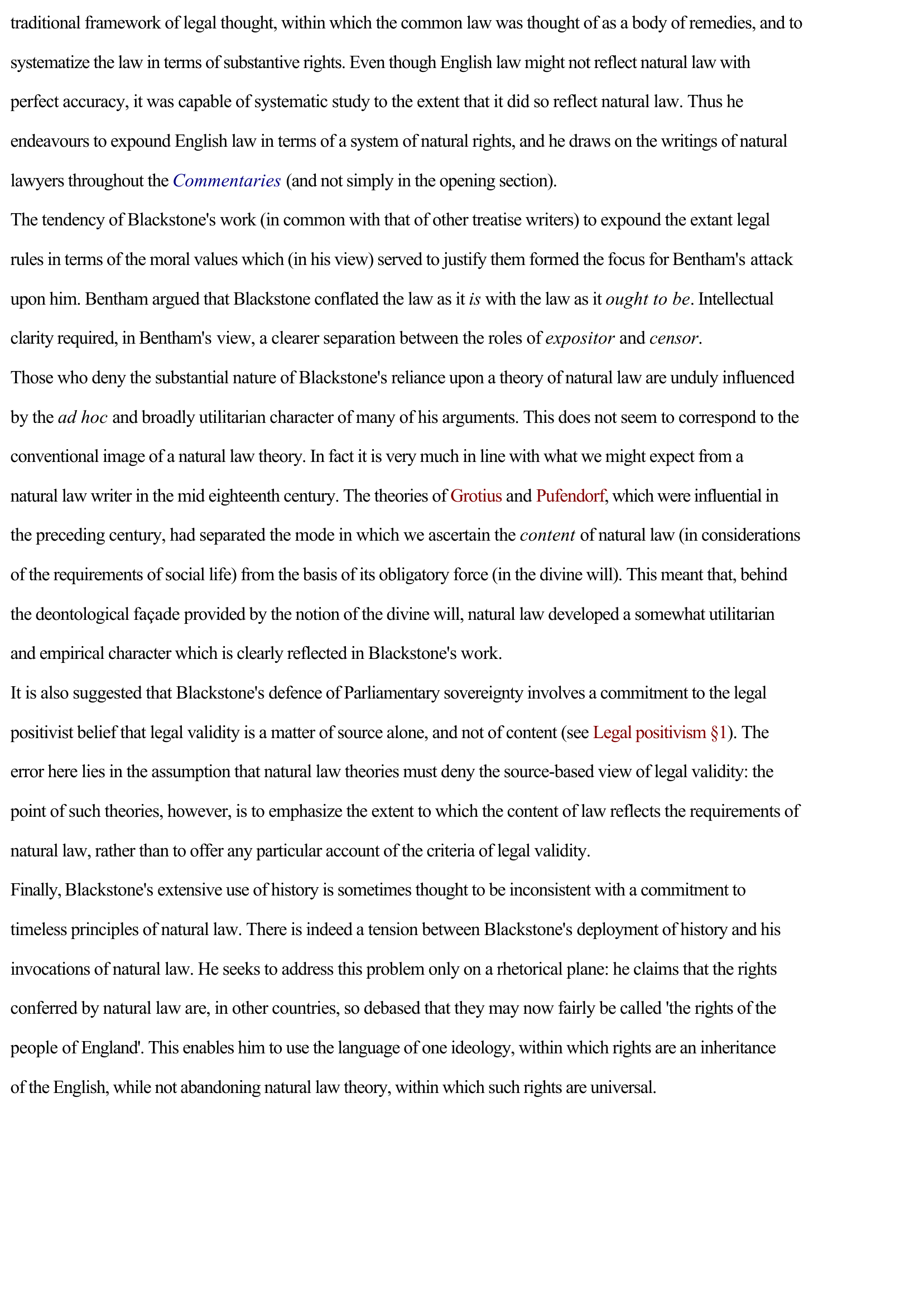Blackstone, William
Publié le 22/02/2012
Extrait du document
«
traditional framework of legal thought, within which the common law was thought of as a body of remedies, and to
systematize the law in terms of substantive rights.
Even though English law might not reflect natural law with
perfect accuracy, it was capable of systematic study to the extent that it did so reflect natural law.
Thus he
endeavours to expound English law in terms of a system of natural rights, and he draws on the writings of natural
lawyers throughout the Commentaries (and not simply in the opening section).
The tendency of Blackstone's work (in common with that of other treatise writers) to expound the extant legal
rules in terms of the moral values which (in his view) served to justify them formed the focus for Bentham 's attack
upon him.
Bentham argued that Blackstone conflated the law as it is with the law as it ought to be .
Intellectual
clarity required, in Bentham 's view, a clearer separation between the roles of expositor and censor .
Those who deny the substantial nature of Blackstone's reliance upon a theory of natural law are unduly influenced
by the ad hoc and broadly utilitarian character of many of his arguments.
This does not seem to correspond to the
conventional image of a natural law theory.
In fact it is very much in line with what we might expect from a
natural law writer in the mid eighteenth century.
The theories of Grotius and Pufendorf , which were influential in
the preceding century, had separated the mode in which we ascertain the content of natural law (in considerations
of the requirements of social life) from the basis of its obligatory force (in the divine will).
This meant that, behind
the deontological façade provided by the notion of the divine will, natural law developed a somewhat utilitarian
and empirical character which is clearly reflected in Blackstone's work.
It is also suggested that Blackstone's defence of Parliamentary sovereignty involves a commitment to the legal
positivist belief that legal validity is a matter of source alone, and not of content (see Legal positivism §1 ).
The
error here lies in the assumption that natural law theories must deny the source-based view of legal validity: the
point of such theories, however, is to emphasize the extent to which the content of law reflects the requirements of
natural law, rather than to offer any particular account of the criteria of legal validity.
Finally, Blackstone's extensive use of history is sometimes thought to be inconsistent with a commitment to
timeless principles of natural law.
There is indeed a tension between Blackstone's deployment of history and his
invocations of natural law.
He seeks to address this problem only on a rhetorical plane: he claims that the rights
conferred by natural law are, in other countries, so debased that they may now fairly be called 'the rights of the
people of England' .
This enables him to use the language of one ideology, within which rights are an inheritance
of the English, while not abandoning natural law theory, within which such rights are universal..
»
↓↓↓ APERÇU DU DOCUMENT ↓↓↓
Liens utiles
- Blackstone, sir William (juriste).
- La Pensée et le mouvant de H. Bergson « sur le pragmatisme de William James » - commentaire
- Beaucoup de bruit : une comédie de William Shakespeare
- litterature.pdf : The play Macbeth was written by William shakespeare
- VATHEK, CONTE ORIENTAL de William Beckford : Fiche de lecture

































